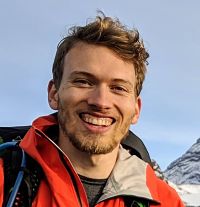Learning = L7. The premise of L7 is simple: human learning and machine learning flourish in tandem. With improvements in human learning, we design machines that learn better and further inform human learning, enabling us to invent better machines, that enable better human learning, and so forth. L7 embodies this principle as a machine learning blog that emphasizes human learning. Topics may include anything from deep learning and machine learning to using machine learning to improve human learning to helping humans learn with machine learning.
Why the name L7?
An L or a 7 alone are fragile shapes, but combined they form a sturdy square. This is an allegory for human learning and machine learning. L7 captures that symmetry about the diagonal. The 7 in L7 counts the letters after the L in Learning.
About the author, Curtis G. Northcutt

I completed my Ph.D. in Computer Science at MIT, where I was fortunate to work with Isaac Chuang. Before that, I was awarded the MIT Morris Joseph Levin Masters Thesis Award for my masters thesis work at MIT, the NSF Fellowship, and the MITx Digital Learning Research Fellowship. I also taught as a TA for MIT’s graduate machine learning course (6.867). Before that, I graduated as valedictorian from Vanderbilt University (2009-2013) where I majored in mathematics and computer science and was awarded the Barry M. Goldwater National Scholarship.
My work spans the theory and applications of artificial intelligence including uncertainty quantification and augmenting human capabilities. I invented confident learning and cleanlab (1.5k+ stars on GitHub), the Python package for machine learning with noisy labels and finding label errors in datasets. Before that, I created the CAMEO cheating detection system used to validate certificates in MITx and HarvardX online course teams. I am grateful to have worked at many of the world’s leading AI research groups, including Google AI, Oculus Research, Facebook AI Research, Amazon AI, Microsoft Research, NASA, MIT, and Harvard.
Working with Richard Newcombe, I created the first augmented reality dataset for multi-person conversational AI, EgoCom. Our associated T-PAMI paper uses the EgoCom dataset to predict turn-taking in conversations.
With friends from Harvard and MIT, I co-founded ChipBrain, an empathy AI company building digital brains. As CTO of ChipBrain, I lead our mission to build emotionally intelligent AI that helps anyone build better relationships and connect with their audience more deeply. We envision a world where people from different backgrounds can empathize with one another, whether it’s solving an argument with a partner, selling a product to a customer, or asking for time off from your boss. You can learn more about ChipBrain in this interview.
In my spare time, I help researchers build affordable state-of-the-art deep learning machines and enjoy competitive mountaineering, hiking, and cycling.
My favorite rapper is PomDP the PhD rapper.
Research Manifesto
- Use machine learning to augment human learning, especially for social good.
- Understand and learn in spite of uncertainty and noise in labeled datasets.
While these two ideas appear disparate, they are mutually dependent. Humans often have false notions about the world and encounter misinformation, yet we still learn well in noisy environments. Augmenting human learning with machine learning necessitates a deeper understanding of learning in noisy environments. Across healthcare, agriculture, politics, economics, transportation… our future as a species relies on an increasing synergy between machine learning and human learning: it is paramount that we have the tools to deal with real-world uncertainty, while maintaining the foresight to focus our advances in machine intelligence towards social good.
Industry and Institutional Research
I am fortunate to have had the opportunity to work or intern at:
- Google AI Research in New York, NY (2019)
- Knowledge AI Startup in Boston, MA (2019-)
- Oculus Research / FRL in Redmond, WA (2018-2019)
- Amazon AI Research in Cambridge, MA (2017)
- Facebook AI Research in New York, NY (2016)
- Microsoft Research India in Bangalore (2014)
- MIT Lincoln Laboratory in Lexington, MA (2013)
- Microsoft in Redmond, WA (2012)
- National Science Foundation NSF REU at Notre Dame (2011)
- General Electric Engineering in Louisville, KY (2010)
- NASA Langley Research Center in Hampton, VA (2009)
as well as academic collaborations and visiting research with MIT, Harvard, Vanderbilt, Notre Dame, and the University of Kentucky. Details here.
If you’d like to author a post on the L7 blog, send me a message. Thanks for reading :)

